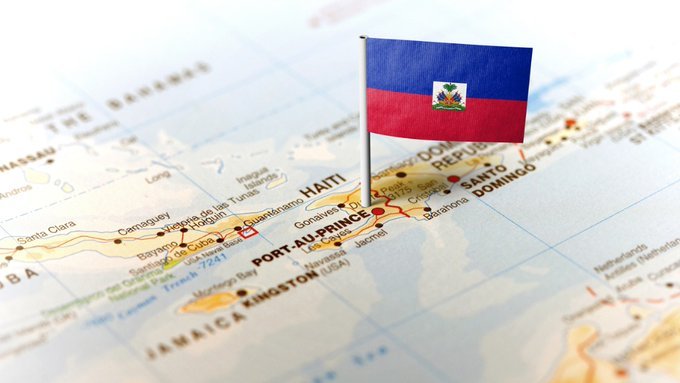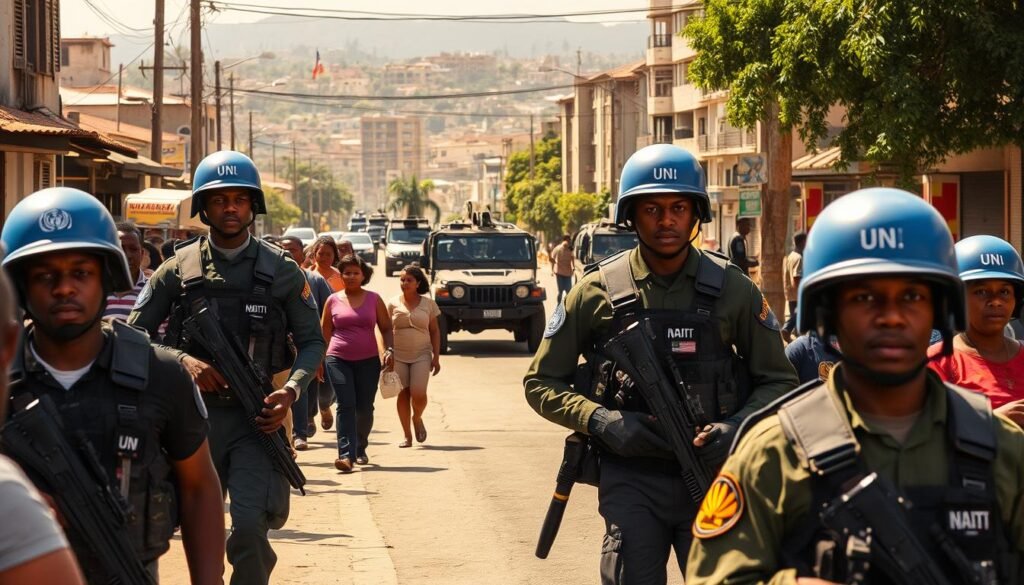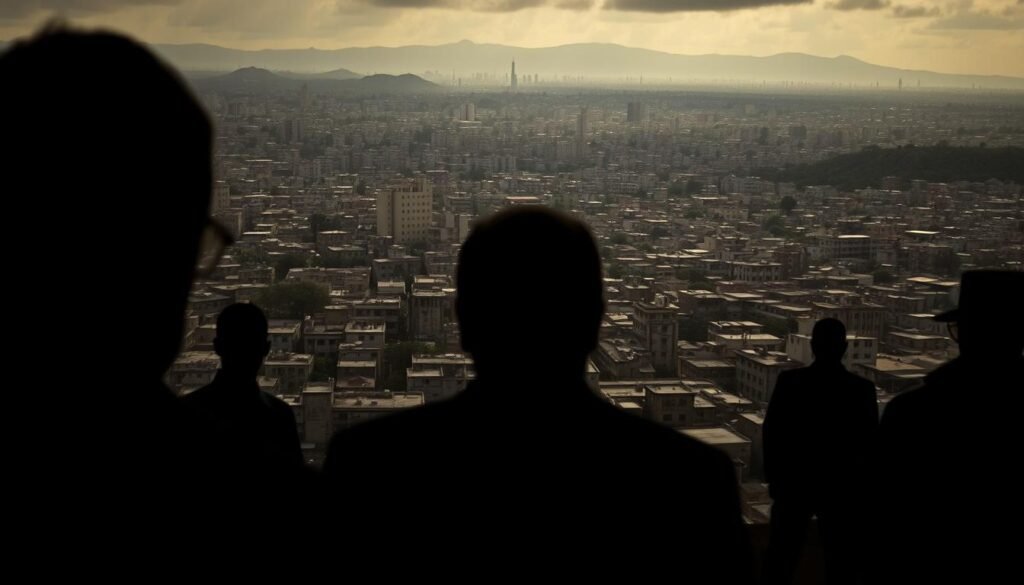Physical Address
304 North Cardinal St.
Dorchester Center, MA 02124
Physical Address
304 North Cardinal St.
Dorchester Center, MA 02124

Discover the harsh realities that Haiti's experience reveals about the hypocrisy of global institutions.
Haiti’s history and experiences have long been a litmus test for the integrity of global institutions. The island nation’s struggles with poverty, inequality, and natural disasters have exposed the hypocrisy of global organizations that claim to champion human rights and sustainable development.
Despite their rhetoric, many global institutions have failed to deliver meaningful support to Haiti, perpetuating a cycle of dependency and inequality. This stark reality raises important questions about the role of global organizations in shaping the fate of vulnerable nations.
By examining Haiti’s experiences, we can gain a deeper understanding of the systemic flaws that undermine global governance and how powerful institutions perpetuate inequality and injustice.
Haiti’s path from the world’s first black republic to a state of perpetual crisis is a compelling narrative that exposes the hypocrisy of global organizations and institutions. Understanding Haiti’s historical context is crucial to grasping its current situation and the role it plays in revealing global injustices.
The Haitian Revolution, which took place from 1791 to 1804, was a pivotal event in world history. It not only led to Haiti’s independence but also had far-reaching implications for the global abolition of slavery.
The revolution was a successful slave revolt that culminated in the establishment of Haiti as the first independent black nation in the world. This achievement sent shockwaves throughout the slave-holding colonies and challenged the status quo of racial hierarchy.
Following its independence, Haiti was forced to pay an “independence debt” to France, which was essentially a ransom for the loss of its “property” (enslaved people). This debt had long-lasting effects on Haiti’s economy, hindering its development for centuries.
Haiti’s history has been marked by significant foreign intervention, which has shaped its political, economic, and social landscape.
The U.S. occupation of Haiti from 1915 to 1934 was a period of significant external influence. The occupation had a lasting impact on Haiti’s infrastructure, economy, and political structures, often to the detriment of its sovereignty.
In the post-World War II era, Haiti continued to experience political instability, with various external actors influencing its internal affairs. This period was characterized by a complex interplay of local and international forces shaping Haiti’s destiny.
As the first black republic, Haiti’s journey exposes the double standards and hypocrisy embedded in the policies of global institutions. The country’s history, marked by revolution and resilience, starkly contrasts with the often hollow promises made by these institutions.
The chasm between the rhetoric of global institutions and their actual deeds is particularly evident in their dealings with Haiti. Promises of aid and support often remain unfulfilled, leaving the country in a state of perpetual crisis.
Following the devastating earthquake, the international community pledged significant aid. However, the delivery of this aid was slow, and much of it never reached the intended beneficiaries. This failure to follow through on commitments highlights the disconnect between the promises made by global institutions and their actions.
Global institutions frequently espouse the importance of human rights. Yet, in Haiti, these rights are often violated with impunity. The lack of accountability for such violations underscores the hypocrisy of these institutions.
The way global institutions interact with Haiti reveals a stark double standard. The principles of democracy and sovereignty are selectively enforced, depending on the geopolitical interests at play.
In Haiti, the push for democratic governance is often overshadowed by the interests of more powerful nations. This selective enforcement of democratic principles is a clear example of the double standards at play.
“The international community’s response to Haiti’s crises has been characterized by a profound disconnect between rhetoric and action.” –
The inconsistency in how global institutions respect or violate national sovereignty is glaring. For some countries, sovereignty is sacrosanct, while for others, like Haiti, intervention is justified under various pretexts.
The experiences of Haiti serve as a mirror, reflecting the hypocrisy and double standards of global institutions. These institutions must acknowledge and address these discrepancies to foster a more equitable international order.
The influence of the IMF and World Bank in Haiti has been a subject of controversy, with many critics labelling their policies as a form of economic colonialism. These institutions have played a significant role in shaping Haiti’s economy, but their interventions have often been criticized for perpetuating dependency rather than fostering sustainable development.
The IMF and World Bank have implemented Structural Adjustment Programs (SAPs) in Haiti, which have had far-reaching consequences. These programs were designed to promote economic stability and growth, but have instead led to significant social and economic challenges.
SAPs led to changes in agricultural policies, including the liberalization of trade, which resulted in an influx of cheap imported goods. This undermined local agriculture, contributing to food insecurity. As
“Haiti’s agricultural sector was decimated by the influx of subsidized rice from the United States, leading to a significant decline in local production.”
Another aspect of SAPs was the privatization of public services. While intended to improve efficiency, privatization often led to increased costs for basic services like water and electricity, affecting the most vulnerable populations.
Haiti’s experience with the IMF and World Bank has also been marked by debt traps. The cycle of loans and conditions attached to these loans has created a situation of economic dependency.
The IMF and World Bank provide loans with conditions that often favour the interests of foreign investors over those of the local population. This has led to a cycle where Haiti struggles to repay debts while facing austerity measures that limit its ability to invest in essential public services.
Haiti’s economic situation serves as a cautionary tale about the risks of economic dependency on international financial institutions. The country’s struggles highlight the need for a more equitable and sustainable approach to economic development.
The United Nations’ involvement in Haiti has been a subject of intense debate, raising questions about its role as peacekeepers versus occupiers. The UN’s mission in Haiti, particularly through MINUSTAH, has been marked by controversy, challenging the organization’s self-image as a benevolent peacekeeper.
MINUSTAH, established in 2004, was tasked with restoring order and stability in Haiti. However, its presence was soon marred by allegations of human rights abuses and sexual exploitation.
Reports of sexual abuse and exploitation by MINUSTAH personnel surfaced, highlighting a disturbing pattern of misconduct.
“The abuse was widespread, and it was not just a few isolated incidents,” said a UN official, acknowledging the severity of the situation.
The UN’s response to these allegations has been criticized for being inadequate, further eroding trust in the organization.
MINUSTAH’s approach to maintaining stability often relied on military solutions, which critics argue exacerbated political tensions rather than resolving them. The use of force as a primary tool for peacekeeping has been questioned, with many arguing that it undermines the very stability it aims to achieve.
One of the most devastating consequences of MINUSTAH’s presence was the introduction of cholera to Haiti in 2010, which led to a massive outbreak and thousands of deaths. The UN’s response to the crisis was initially criticized for being slow and inadequate.
It wasn’t until several years later that the UN finally acknowledged its role in the cholera outbreak. This acknowledgment was seen as a significant step towards accountability, but it was met with skepticism by many who felt it did not go far enough.
The UN has promised compensation to victims of the cholera outbreak, but the delivery of these promises has been slow. As of now, the process remains ongoing, with many victims still awaiting justice.
| Year | Event | UN Response |
|---|---|---|
| 2010 | Cholera Outbreak | Initial denial of responsibility |
| 2016 | UN Acknowledges Role | Promise of compensation |
| 2023 | Ongoing Compensation Process | Slow delivery of aid |

The complexities surrounding the UN’s role in Haiti underscore the need for a nuanced understanding of peacekeeping and its challenges. As the UN continues to evolve its approach, the lessons from Haiti will be crucial in shaping future missions.
The presence of numerous NGOs in Haiti has led to a phenomenon known as the “Republic of NGOs.” This term reflects the significant role that non-governmental organizations play in the country’s development and humanitarian efforts. While NGOs can provide crucial support, their dominance in Haiti’s aid landscape raises important questions about the long-term implications of their involvement.
The proliferation of NGOs in Haiti has resulted in a complex ecosystem where these organizations often operate independently of government oversight. This has led to two significant issues:
By directly implementing projects, NGOs often bypass Haitian government institutions, undermining their capacity and legitimacy. This can create a dependency on foreign aid and hinder the development of sustainable local governance structures.
The lack of coordination among NGOs can lead to competition for resources and duplication of efforts. This inefficiency can result in wasted resources and a lack of comprehensive coverage of needs across different regions.
The NGO sector in Haiti faces significant challenges related to accountability and the alignment of incentives. Two critical aspects of this issue are:
NGOs often design projects based on donor priorities rather than local needs. This can lead to initiatives that do not address the most pressing issues on the ground, reducing their overall impact and sustainability.
High-profile failures, such as the Red Cross housing scandal, highlight the risks of misaligned incentives and a lack of accountability. These incidents underscore the need for more transparent and effective NGO operations.
The aid industry’s self-perpetuating cycle in Haiti is a complex issue that requires a nuanced understanding of the interactions between NGOs, government institutions, and local communities. By addressing the challenges associated with NGO operations, it is possible to create a more effective and sustainable aid ecosystem.
Haiti has long been a stage for foreign powers to play out their geopolitical games, with far-reaching consequences for its people. The country’s history is marked by interventions and influences from various nations, each driven by its own interests.
The United States has been a significant player in Haitian affairs, with its interventions often justified under the banner of promoting democracy. However, the true motivations behind these actions are subject to debate.
The U.S. has been implicated in several coups in Haiti, including those in 1991 and 2004. These events raise questions about the extent of U.S. influence and its role in shaping Haiti’s political landscape.
The 1991 coup, which ousted President Jean-Bertrand Aristide, was widely condemned, and the U.S. was accused of having a hand in it. Similarly, the 2004 coup, which again removed Aristide from power, saw significant U.S. involvement, with the U.S. providing military support.
U.S. interventions in Haiti are often driven by economic interests, including the desire to secure resources and control strategic infrastructure. The U.S. has significant investments in the region and seeks to protect its economic foothold.
France and Canada, among other nations, have also played significant roles in Haiti, often maintaining neo-colonial relationships that perpetuate their influence over the country’s affairs.
France’s historical role in Haiti is particularly significant, given its colonial past. France has maintained considerable economic influence, partly due to historical debt claims that have been a burden on Haiti’s economy.
The Core Group, which includes representatives from the U.S., France, Canada, and other nations, has been instrumental in shaping Haiti’s political trajectory. This group exerts significant external control over Haiti’s political decisions, often to the detriment of Haitian autonomy.
The geopolitical dynamics at play in Haiti are complex, with various foreign powers vying for influence. Understanding these dynamics is crucial to grasping the challenges faced by Haiti and the Haitian people.

| Country | Influence Type | Impact on Haiti |
|---|---|---|
| United States | Political and Economic | Significant influence on political decisions and economic policies |
| France | Economic and Historical | Maintains economic grip through historical debt claims and ongoing investments |
| Canada | Political and Economic | Active in political mediation and economic investments |
Haiti’s image in the global media landscape is often distorted, reflecting more about the observers than the observed. This distortion has significant implications for how the world understands and interacts with Haiti.
The media’s portrayal of Haiti often focuses on sensationalized disaster coverage, lacking the historical and socio-political context that could provide a deeper understanding of the issues. This phenomenon is known as “disaster pornography.”
Labelling Haiti as the “poorest country in the Western Hemisphere” oversimplifies the complex economic and political factors at play. It ignores the historical context of foreign interventions and economic policies that have contributed to Haiti’s current state.
By focusing on immediate crises rather than the underlying causes, the media often fails to provide a nuanced understanding of Haiti’s challenges. This includes overlooking the impact of colonialism, foreign debt, and political instability.
The dominance of external narratives about Haiti often silences the voices and perspectives of Haitians themselves. This is evident in the preference for foreign experts over local knowledge.
The reliance on foreign experts to explain Haiti’s situation can overshadow the insights and solutions proposed by Haitians. This not only marginalizes local voices but also neglects the rich, contextual understanding that Haitians can provide.
Fortunately, alternative media platforms are emerging, offering counter-narratives that amplify Haitian voices and challenge the dominant discourse. These platforms provide a space for diverse perspectives, fostering a more nuanced global understanding of Haiti.
By recognizing and engaging with these alternative narratives, there’s an opportunity to reshape the global conversation about Haiti, moving beyond stereotypes and simplistic portrayals towards a more informed and empathetic understanding.
Haitian communities have long been at the forefront of resistance and innovation, shaping their own futures. Amidst the myriad challenges faced by the nation, the stories of resilience, solidarity, and determination of its people often go unnoticed.
At the heart of Haiti’s resistance are grassroots movements that have been pivotal in driving change. These movements are characterized by their commitment to local solutions that address the specific needs of Haitian communities.
Peasant organizations have been instrumental in promoting food sovereignty, enabling Haitian farmers to reclaim their agricultural practices and resist the influence of foreign agribusiness. This movement not only supports local economies but also preserves traditional farming methods.
In urban areas, community-led initiatives have emerged to counteract gang violence. These programs focus on providing education, job training, and social support to at-risk youth, offering alternatives to violence and fostering community cohesion.
The Haitian diaspora plays a crucial role in supporting the country’s development through various forms of engagement. Their contributions underscore the strength of transnational solidarity and the global connections that sustain Haitian communities.
Remittances from the diaspora constitute a significant source of financial support for families in Haiti, often surpassing the amount of traditional foreign aid. This financial inflow is critical for sustaining local economies and supporting community initiatives.
Beyond financial support, the diaspora is also involved in political advocacy and cultural resistance. Through various platforms, they raise awareness about Haiti’s challenges and promote the country’s rich cultural heritage, challenging negative stereotypes and fostering global solidarity.
| Initiative | Focus Area | Impact |
|---|---|---|
| Peasant Organizations | Food Sovereignty | Promotes local agriculture, supports farmers’ rights |
| Urban Community Programs | Gang Violence Prevention | Provides education and job training to at-risk youth |
| Diaspora Remittances | Economic Support | Financial lifeline for families, supports local economies |
Haiti’s struggles and the global response to its crises reveal a complex web of hypocrisy and neocolonialism. To move forward, it’s essential to reimagine global solidarity with Haiti, focusing on Haitian-led solutions and equitable international cooperation.
Rather than perpetuating the status quo, global solidarity should prioritize supporting local initiatives and amplifying Haitian voices. This involves reimagining aid to ensure it’s not a tool for external control but a means to empower Haitian communities.
By adopting a more inclusive and equitable approach, global solidarity can help Haiti overcome its challenges. This requires a fundamental shift in how international organizations and institutions engage with Haiti, prioritizing Haitian-led solutions and fostering a more just and equitable partnership.
Together, we can work towards a brighter future for Haiti, one that is shaped by the needs and aspirations of its people, not dictated by external interests.
The article argues that Haiti’s experiences and history expose the hypocrisy of global organizations and institutions, highlighting the disconnect between their promises and actions.
The article discusses Haiti’s revolutionary past, the “independence debt” imposed by France, and centuries of foreign intervention, including the U.S. occupation and its lasting effects.
The article critiques the IMF and World Bank’s policies as a form of economic colonialism, analyzing the impact of structural adjustment programs and debt traps that contribute to economic dependency.
The article discusses the controversies surrounding MINUSTAH, including human rights abuses, the cholera outbreak, and the challenges in achieving justice and compensation for victims.
The article critiques the role of international NGOs, discussing how they can create a self-perpetuating cycle that undermines local institutions, and highlighting issues of accountability and misaligned incentives.
The article analyzes U.S. interventions and the roles of other powers like France and Canada, highlighting the neo-colonial dynamics at play and the economic interests behind political decisions.
The article discusses how the media often perpetuates stereotypes, ignoring the root causes of Haiti’s issues, and silencing Haitian voices, contrasting this with the emergence of alternative media and counter-narratives.
The article highlights the often-overlooked stories of Haitian resistance and agency, discussing grassroots movements, local solutions, and the contributions of the Haitian diaspora.
The article emphasizes the need for a new approach to global solidarity with Haiti, calling for a shift towards Haitian-led solutions and a more equitable form of international cooperation.